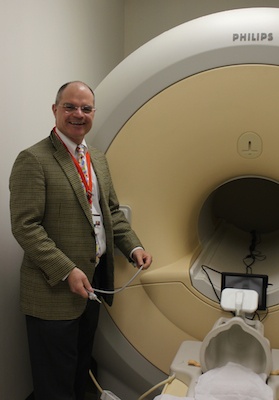Jeffrey Carr, M.D., M.Sc., recently joined Vanderbilt as the Cornelius Vanderbilt Professor of Radiology & Radiological Sciences and professor of Clinical Biomedical Informatics and Cardiovascular Medicine. Carr, a member of the Vanderbilt University School of Medicine class of 1989, returns to his alma mater from Wake Forest School of Medicine, where he had been on faculty since 1990, most recently with professorship appointments in Radiology, Internal Medicine, Translational Science and Public Health Sciences.
At Vanderbilt, Carr will combine his clinical interests in radiology with epidemiologic research in cardiovascular medicine.“Given his collegial nature and creative spirit, we are very lucky to have recruited Dr. Carr to Vanderbilt,” said Reed Omary, M.D., M.S., Carol D. & Henry P. Pendergrass Professor of Radiology and Radiological Sciences and chair of the department. “Because he so much enjoys working at the interface between disciplines, he will help create programs that benefit a broad spectrum of investigators across the Medical Center, including radiology, cardiology, informatics and population health.”
With a master’s degree in public health and epidemiology, Carr has focused his research on using imaging to help understand why some people develop heart disease and others are spared. His clinical interests lie in developing imaging techniques with CT angiography, cardiac MRI and CT scans to identify those at high risk for cardiac-related diseases.
“For many individuals they are walking around healthy one minute and then stricken by a heart attack the next. The individual experiences a near instantaneous change in health status and in some cases this may even be fatal. The reality is that the disease of atherosclerosis has been progressing for decades,” Carr said.
“The combination of imaging data and other biomarkers may allow us to identify the individuals at highest risk for progressing from subclinical disease to clinical disease. This will provide health care providers a window of time to intervene before clinical disease occurs.”
Carr did his residency in diagnostic radiology at North Carolina Baptist Hospitals and a fellowship in body and cardiovascular magnetic resonance imaging at the Hospital of the University of Pennsylvania. Most recently he was vice chair of Clinical Research and director of the Biomedical Informatics Center at Wake Forest University.
“One of the many exciting aspects about returning to Vanderbilt is the existing infrastructure for using personalized medicine to predict how people respond to drugs.
“Developing expanded tools that utilize imaging fits nicely in the Vanderbilt personalized medicine framework,” Carr said.
